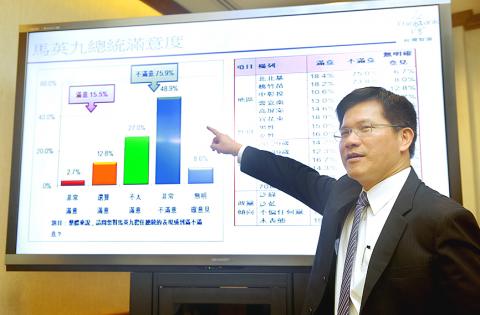A new opinion poll by the Taiwan Thinktank shows that President Ma Ying-jeou’s (馬英九) approval rating has hit a new low amid widespread opposition to his plan to revise the Chinese Nationalist Party (KMT) charter so that a sitting president from the party automatically becomes the party chairman.
The think tank said yesterday that almost two in three respondents, or 65.7 percent, said they disagreed with the planned revision of the KMT charter, which is to be voted on tomorrow, and 65.1 percent said Ma, who is the current KMT chairman, should be held accountable if the party loses next year’s seven-in-one municipal elections.
While Ma has called the charter revision a “sacrifice” because it means his current four-year term as chairman could be cut short, “it is, in fact, Ma’s attempt to shun his responsibility for a potential loss in the elections,” Democratic Progressive Party (DPP) Legislator Lin Chia-lung (林佳龍) told a press conference organized by the think tank.

Photo: Liao Chen-huei, Taipei Times
The poll, conducted from Tuesday to Thursday, found that just 15.5 percent of respondents approved of Ma’s performance, the lowest since the think tank began conducting a bi-monthly poll in March last year. His disapproval rating also hit a record high of 75.9 percent.
Ma’s unpopular policies and poor credibility were obvious the respondents, with 70.5 percent disagreeing with his description of the cross-strait relations as“not international relations,” 80.2 percent saying he does not have the ability to keep Taiwan’s GDP above 2 percent and 90.3 percent saying they have no confidence in the government’s capability to improve food safety.
Meanwhile, Premier Jiang Yi-huah’s (江宜樺) honeymoon period also seems to be over, as both his approval rating, 19.5 percent, and disapproval rating, 62.3 percent, were the worst since his inauguration in February.
“It seems to me that people have come to realize what kind of politician Jiang, a former academic of high acclaim, is,” Soochow University professor Hsu Yung-ming (徐永明) said.
Opinions on cross-strait policies and developments were more divided.
Asked if they were worried about Taiwan being unified with China, 50.8 percent said yes, while 45.3 percent said no, with 3.9 percent declining to give an answer.
Asked if they support Ma conducting political negotiations with Beijing before his current term ends, 41.8 percent were supportive of the idea, while 45.1 percent disagreed. However, 67.9 percent of those polled said a national referendum must be held before such negotiations take place, with only 22.9 percent saying a referendum was not necessary.
Most respondents said officials involved in recent controversies should step down, with 67.6 percent calling for Prosecutor-General Huang Shih-ming (黃世銘) to resign over his role in the wiretapping of the legislature and 70.9 percent urging Minister of Health and Welfare Chiu Wen-ta (邱文達) to resign for his inability to manage the food safety crisis.
The survey collected 1,074 valid samples and had a margin of error of 3 percentage points.

Alain Robert, known as the "French Spider-Man," praised Alex Honnold as exceptionally well-prepared after the US climber completed a free solo ascent of Taipei 101 yesterday. Robert said Honnold's ascent of the 508m-tall skyscraper in just more than one-and-a-half hours without using safety ropes or equipment was a remarkable achievement. "This is my life," he said in an interview conducted in French, adding that he liked the feeling of being "on the edge of danger." The 63-year-old Frenchman climbed Taipei 101 using ropes in December 2004, taking about four hours to reach the top. On a one-to-10 scale of difficulty, Robert said Taipei 101

Nipah virus infection is to be officially listed as a category 5 notifiable infectious disease in Taiwan in March, while clinical treatment guidelines are being formulated, the Centers for Disease Control (CDC) said yesterday. With Nipah infections being reported in other countries and considering its relatively high fatality rate, the centers on Jan. 16 announced that it would be listed as a notifiable infectious disease to bolster the nation’s systematic early warning system and increase public awareness, the CDC said. Bangladesh reported four fatal cases last year in separate districts, with three linked to raw date palm sap consumption, CDC Epidemic Intelligence

US climber Alex Honnold left Taiwan this morning a day after completing a free-solo ascent of Taipei 101, a feat that drew cheers from onlookers and gained widespread international attention. Honnold yesterday scaled the 101-story skyscraper without a rope or safety harness. The climb — the highest urban free-solo ascent ever attempted — took just more than 90 minutes and was streamed live on Netflix. It was covered by major international news outlets including CNN, the New York Times, the Guardian and the Wall Street Journal. As Honnold prepared to leave Taiwan today, he attracted a crowd when he and his wife, Sanni,

Taiwanese and US defense groups are collaborating to introduce deployable, semi-autonomous manufacturing systems for drones and components in a boost to the nation’s supply chain resilience. Taiwan’s G-Tech Optroelectronics Corp subsidiary GTOC and the US’ Aerkomm Inc on Friday announced an agreement with fellow US-based Firestorm Lab to adopt the latter’s xCell, a technology featuring 3D printers fitted in 6.1m container units. The systems enable aerial platforms and parts to be produced in high volumes from dispersed nodes capable of rapid redeployment, to minimize the risk of enemy strikes and to meet field requirements, they said. Firestorm chief technology officer Ian Muceus said